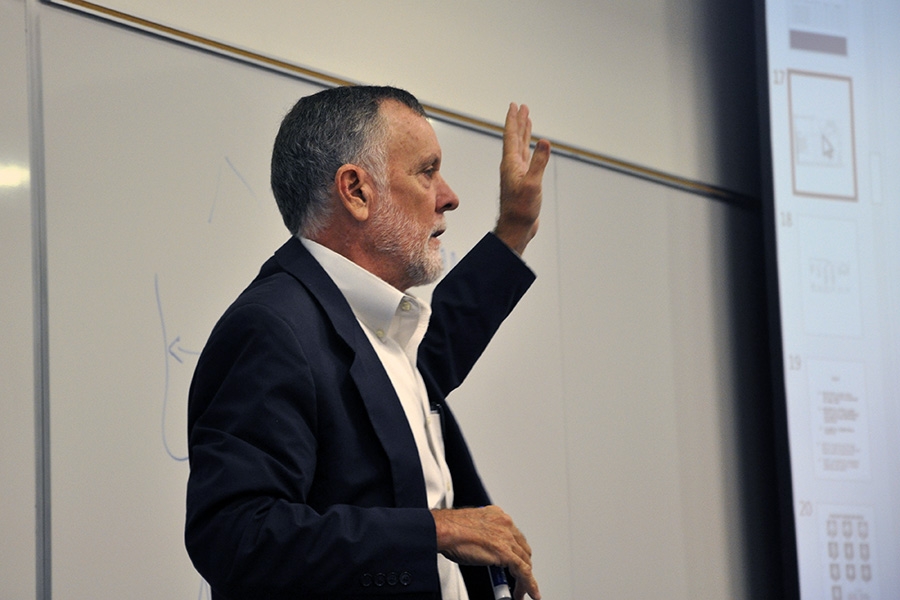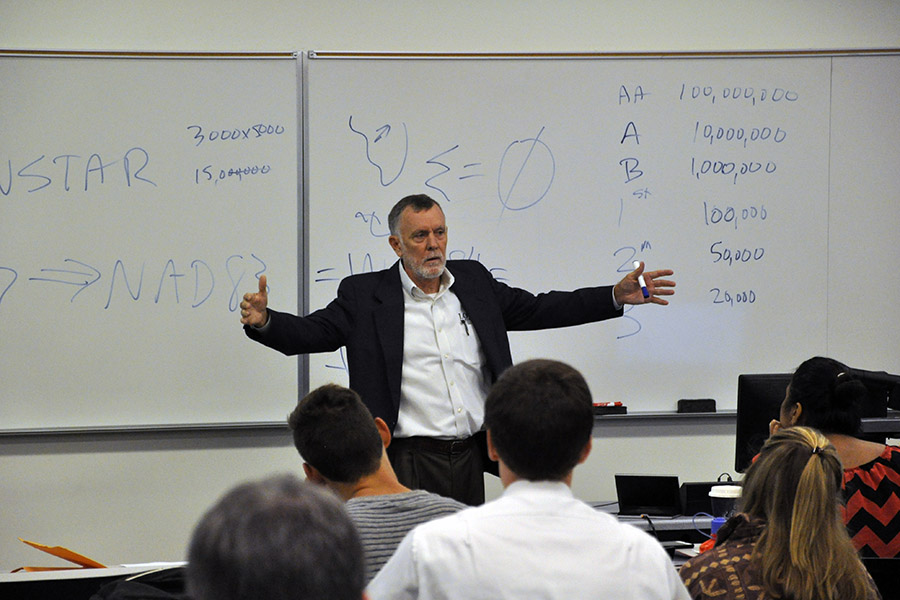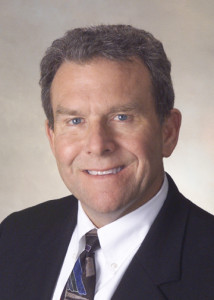
 Lowe Engineers partner Bill Daniel teaches students about the origins of the GPS system on a September Monday morning. Daniel and another Lowe partner, Jon Drysdale, have been co-teaching this Geomatics course as adjunct professors in the School of Civil and Environmental Engineering for almost 20 years. The two professionals bring their vast experience into the classroom — and get a first-hand look at the newest young crop of engineers at Georgia Tech. (Photo by Joshua Stewart.) |
It’s early on a Monday with campus still quiet from its Sunday night slumber. A mostly empty Mason building awaits the rush of the day.
And in one classroom, two adjunct professors are taking time from their busy careers to teach dozens of civil engineering undergrads about surveying, Geographic Information Systems (GIS), and a little about what it’s really like to be a practicing engineer.
Bill Daniel and Jon Drysdale have been tag-teaming the School of Civil and Environmental Engineering’s Geomatics course for nearly two decades, bringing a healthy dose of reality and years of experiences won during careers that have literally spanned the globe.
Yet many people in the School have never seen or met the two men.
“The students just love the fact that we teach what we do for a living,” said Daniel, a licensed land surveyor. “They don’t laugh when we say, ‘We’re going to leave here and go to our real job,’ because they know that’s what we do.”
“We think we’re adding something,” Drysdale said. “We’re not research people. We’re not academics. We’re in the real world, so we’re contributing something back to the school.”
 Drysdale |
Fruitful partnership
The classroom partnership — Daniel teaches the surveying portion of the course, Drysdale the GIS portion — extends what has been a fruitful business relationship dating back 30 years. The two men are partners in Atlanta’s Lowe Engineers, where they have done everything from classified jobs for the military to providing the government services of several metro Atlanta cities. (More on that in a minute.)
Teaching an 8 o’clock class every Monday and Wednesday has meant some scheduling give-and-take, the pair said. But it’s worth it, Drysdale said, to influence the next generation of engineers — and tap into the pipeline of talent in the School.
“We’ve hired a lot of people out of our class,” said Drysdale, a licensed professional engineer who also earned his master’s degree in the School in 1981. “[We teach] to keep in touch with the crop of students that’s coming out of school and see what kind of people they are.
“We’ve hired some as interns. One of [our former students] is a partner here now,” he said. “We hired him as a sophomore co-op in ’86. We see other people who are going to be future partners. And we run into people all the time who were in our class, who will come up to us or they’ll be working as one of our clients.”
Work for those clients has been all over the world, from mapping Egyptian air bases during the first Gulf War in the early 1990s to working on U.S. Army bases in Germany. Both men have security clearances from the government so they can work on sensitive projects.
They work closer to home, too, with current contracts for levies and hydrographic surveying for the New Orleans district of the Army Corps of Engineers. Not long ago they did the first hydrographic surveys of four major lakes in Georgia for the Army Corps, meaning we’ll know the actual capacity of those reservoirs for the first time. Up until now, the Corps had to judge water levels based on a 70-year-old contour map.
Creating a new kind of government
These days, however, Daniel and Drysdale seem most excited about work reshaping how city governments function in the Atlanta area.
Lowe Engineers has been part of a team of companies contracted to provide municipal services for Sandy Springs, Georgia, and a host of newly formed cities in the region, including Dunwoody, Brookhaven, Milton and Johns Creek.
“We’re their public works department, their parks department. They’re outsourcing that to us as a contractor. And we’ve got the experience,” Daniel said.
“We’ve shown that you can run a government differently on these services and provide them cheaper and better and faster,” Drysdale said. “We constantly get feedback about how we get stuff done.”
Reality check
They said they want to bring that reality check into the classroom for students so they realize there’s much more to “getting stuff done” than just the engineering part, especially as students ascend into leadership positions.
“Every day, we spend time worried about getting paid, making the next payroll. Once you win the job, you have to request money and get paid for it, and students don’t know anything about this,” Drysdale said.
“I go off on a tangent [in class] and talk about teaming and business, how we go get a job,” Daniel said. “They think that magically these projects fall in our lap. I go through the process of how we obtain federal contracts and how we obtain state contracts. I even go into what’s a part of overhead.”
Daniel said he also encourages students not to lose sight of the big picture as they’re finishing up their degrees.
“One thing we make sure of is that they’re on the career path to get licensed — getting the Fundamentals of Engineering exam out of the way, knowing that they have to go to work for a licensed civil engineer so they can get four years of experience under their direct supervision,” Daniel said.
“It amazes me that so many [students] are going to spend the money and the time and the energy to go get their degree, yet they don’t know that path. We make sure that they know that.”
